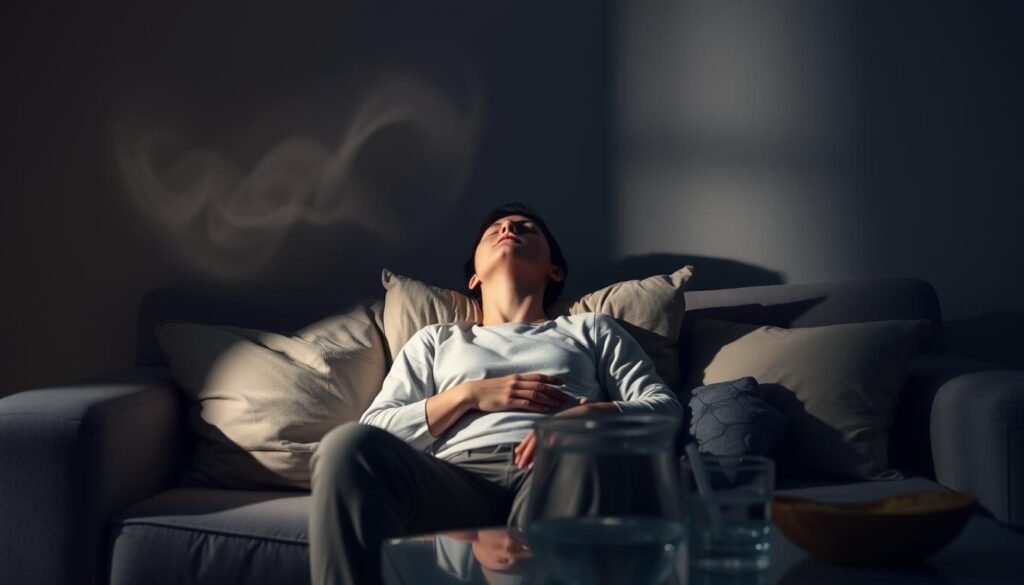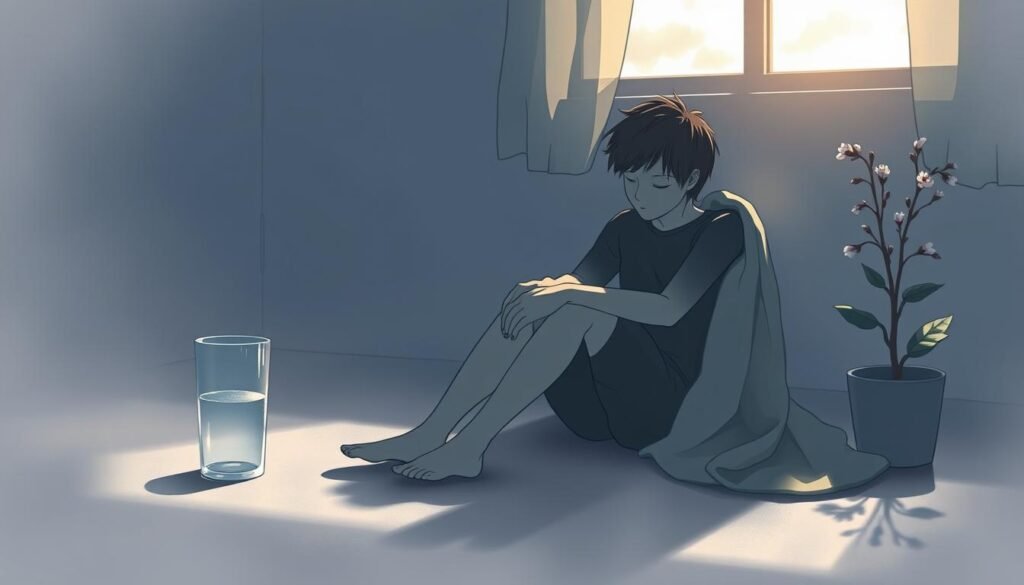Did you know more than 20% of Americans feel chronically fatigued at times? This large number points out how many people deal with tiredness daily. Lightheadedness and fatigue are big problems; they hinder daily tasks and lower life quality.
It’s key to know how these symptoms interact for better management. By finding out the root causes, you can fight off dizziness and tiredness. Early symptom recognition prevents them from getting worse, leading to improved health. For hints on handling lightheadedness, visit this link on lightheadedness and fatigue.
Key Takeaways
- Chronic fatigue affects over 20% of Americans at some point.
- Lightheadedness can result from various medical conditions.
- Dehydration is a common cause of dizziness and lightheadedness.
- Anemia significantly contributes to fatigue, especially in women.
- Maintaining hydration and stable blood sugar levels can prevent episodes.
- Recognizing the symptoms early can help manage potential health issues.
Understanding Lightheadedness
Lightheadedness makes you feel faint or woozy, like you might pass out. People experience it in different ways. Some feel dizzy, off-balance, or even have vertigo. Vertigo makes you feel like everything is spinning.
If you’re lightheaded, you might also feel nauseous, sweaty, or have blurry vision. These signs can make you more uncomfortable and anxious. Age and having had dizziness before can increase your risk. Older adults are more likely to get dizzy due to health issues.
Many seek medical advice for ongoing dizziness or lightheadedness. The duration of dizziness varies, lasting from a few seconds to days. If not addressed, it can affect your life quality. It can also lead to dangerous falls.
Lightheadedness might stem from ear infections, low blood sugar, not drinking enough water, or stress. For natural ways to feel better, check out these tips. They help support adrenal health and reduce symptoms.
Common Symptoms of Lightheadedness and Fatigue
Lightheadedness and fatigue can lead to feelings that upset us. You might feel dizzy, unwell, and very weak. These issues can make daily tasks hard to do. People often feel tired, even after sleeping well, showing how deep fatigue runs.
Malaise means you feel uneasiness or discomfort which comes with these problems. It makes you feel low energy all day. Some feel weak slowly, while others feel it suddenly, messing up their day.
Chronic fatigue syndrome (CFS) makes people less functional because of constant tiredness. People with CFS often feel very tired. They also experience dizziness and find it hard to focus. Things like not drinking enough water and low blood sugar can start these problems.

Knowing these symptoms helps in deciding when to get medical help. If you keep feeling lightheaded or very tired, seeing a doctor is important. Sharing all your symptoms with them can help find out the problem and plan a treatment.
| Symptom | Description | Possible Causes |
|---|---|---|
| Dizziness | A sensation of lightheadedness or unsteadiness | Dehydration, low blood sugar, anemia |
| Fatigue | Extreme tiredness or lack of energy | Chronic fatigue syndrome, anemia |
| Malaise | A general feeling of discomfort or unease | Common colds, infections |
| Weakness | A feeling of reduced strength or energy | Low iron levels, chronic illness |
Potential Causes of Lightheadedness
Understanding the potential causes of lightheadedness helps people know when to look for help. Many things cause feelings of dizziness and tiredness. Here are the main reasons explained more clearly.
Low Blood Sugar
Our bodies need glucose to make energy. If blood sugar gets too low, you might feel lightheaded or very tired. People with diabetes need to watch what they eat closely. This helps prevent these problems.
Besides dizziness, one might feel weak, confused, or grumpy.
Dehydration
Not drinking enough water affects the body badly, leading to dizziness and tiredness. Dehydration happens if it’s very hot, you’re very active, or not drinking enough water. It’s important to drink more water, especially in hot weather. This keeps you healthy and stops you from feeling lightheaded.
Low Blood Pressure
Low blood pressure makes it hard for blood to move around the body. This can make you feel dizzy or sick to your stomach. It usually happens when you get up too fast.
You might also have a hard time focusing. Watching your blood pressure closely is key if this happens often.

| Cause | Symptoms | Prevention |
|---|---|---|
| Low Blood Sugar | Dizziness, weakness, confusion | Regular meals, balanced diet |
| Dehydration | Dizziness, fatigue, dry mouth | Increased fluid intake, especially when active |
| Low Blood Pressure | Lightheadedness, nausea, concentration issues | Gradual position changes, regular check-ups |
Health Conditions Related to Fatigue
It’s crucial to know what health issues can lead to fatigue to find the right treatments. Chronic fatigue syndrome and anemia are major disorders linked to constant tiredness. Each of these conditions has distinct features and symptoms that affect everyday life.
Chronic Fatigue Syndrome
Chronic fatigue syndrome (CFS) is marked by severe tiredness that doesn’t go away with rest and lasts at least six months. Those with CFS may feel dizzy, have trouble thinking clearly, and feel more ill after physical or mental effort. Diagnosing CFS involves looking at various symptoms, as no one test can confirm it. It might stem from genetic factors, past infections, or other health issues. For more details, you can visit this resource.
Anemia
Anemia occurs when there aren’t enough red blood cells to carry oxygen to the body’s tissues, causing tiredness and dizziness. This condition can come from not getting enough nutrients, losing blood over time, or having certain diseases. The impact of anemia on one’s life can be deep, leading to severe fatigue and weakness. It’s important to know the type of anemia to get the right treatment and deal with any related health issues.

| Condition | Symptoms | Common Causes | Potential Treatments |
|---|---|---|---|
| Chronic Fatigue Syndrome | Extreme fatigue, dizziness, cognitive disturbances, post-exertional malaise | Genetics, infections, other related health conditions | Symptom management, physical therapy, light-intensity exercise |
| Anemia | Fatigue, dizziness, weakness | Nutritional deficiencies, chronic bleeding, medical conditions | Iron supplements, dietary changes, treatment of underlying causes |
Dizziness: Types and Their Implications
Dizziness includes different types, each with its own health meanings. Understanding these can help find the right diagnosis. The main types are vertigo, disequilibrium, presyncope, and lightheadedness.
About 45-54% of people with dizziness feel vertigo, which is like spinning. This usually means a problem with the inner ear. Up to 16% feel disequilibrium, which is trouble with balance. Presyncope, feeling like you’ll faint, affects up to 14%. About 10% feel lightheaded. These can be due to many health issues.
About 3% of adult visits to primary care doctors are for dizziness. Emergency rooms also see dizziness in nearly 3% of visits. Sadly, up to 20% leave without knowing exactly why. This shows why a deep look into symptoms is key.
If you’re feeling dizzy, seeing a doctor is important. A detailed talk about your symptoms and a physical exam can help find the cause and treatment. For deeper information on dizziness, checking resources like those found on this resource can help.
Lightheadedness and Fatigue: Common Causes & Solutions
Lightheadedness and fatigue can stem from various factors. These include certain medications and irregular heart rhythms. Understanding these causes is key to finding relief.
Medications
Several medications might make you feel light-headed or tired. For example, antidepressants, muscle relaxants, and diuretics often list dizziness as a side effect. If you’re affected, talk to a doctor about your meds. They might adjust your doses or suggest different drugs to help manage these symptoms.
Irregular Heart Rhythms
Arrhythmias, or irregular heart rhythms, can really affect your blood flow. This may make you feel dizzy and tired. These conditions might also cause fainting, chest pain, and shortness of breath. It’s important to get regular heart check-ups if you have these symptoms. Doing so helps diagnose and treat the problem effectively.
There are also natural ways to support your health. Making lifestyle changes can improve how you feel. You might also look into things like acupuncture or herbal remedies for more energy. To learn more about these natural treatments, check out this useful resource.
| Medication Type | Common Side Effects | Alternative Solutions |
|---|---|---|
| Antidepressants | Dizziness, drowsiness | Consult a therapist for alternatives |
| Diuretics | Fatigue, dehydration | Hydrate, monitor electrolyte levels |
| Anxiolytics | Lightheadedness, sleepiness | Explore mindfulness techniques |
Managing and Treating Lightheadedness and Fatigue
Dealing with lightheadedness and fatigue involves self-care and knowing when to see a doctor. Learning to manage these symptoms can greatly improve your life.
Self-Care Strategies
Applying self-care is key for those feeling lightheaded and tired. A few simple changes can help a lot. Here are some tips:
- Stay hydrated by drinking water all day.
- Consume snacks with sugar or carbs for low blood sugar.
- Rise slowly to avoid blood pressure drops.
- Moderate intake of caffeine, alcohol, salt, and tobacco to lessen symptoms.
- Rest adequately to prevent fatigue and stress.
Adding these self-care steps can help you function better daily.
When to See a Doctor
It’s crucial to know when to get medical help. Look out for these warning signs:
- Fainting or ongoing severe dizziness.
- Confusion or changes in how you think.
- Chest pain, signaling a possible big health issue.
- Being very sick with vomiting or not enough fluids.
If you notice these, see a doctor right away. They may run tests to find the cause of your symptoms. It’s important to follow their recommended treatment.
Preventing Lightheadedness and Fatigue
Preventing lightheadedness and fatigue starts with simple lifestyle changes. These steps boost our well-being. Drinking enough water is crucial because it keeps our blood volume healthy and improves circulation. Not drinking enough leads to dehydration, making you feel lightheaded. Try to drink at least eight glasses of water daily. Adjust this amount based on how active you are and the weather.
Eating well is just as important. Fill your diet with fruits, veggies, whole grains, and lean meats to keep your energy up. Cut down on high-sugar snacks to keep your blood sugar steady. This helps stop dizziness and feeling weak.
Keeping stress low is essential. Practices like mindfulness meditation or yoga can lower stress. This makes you less likely to feel lightheaded. Also, avoid sudden moves, especially getting up fast, to prevent dizziness.
Seeing your doctor regularly is important too. They can keep an eye on any health issues. For illnesses like Chronic Fatigue Syndrome, they suggest specific plans. These can include learning about your condition, pacing your activities, and trying cognitive therapy. The EUROMENE guidelines back these steps.
Knowing your limits is key. Include breaks in your day and tackle tasks little by little. This stops Post-Exertional Malaise, where symptoms get worse after effort. Staying proactive helps keep you healthy and less prone to lightheadedness and fatigue.
Conclusion
Understanding lightheadedness and fatigue is essential. These symptoms are often caused by dehydration and lack of nutrients. They show up as feeling unsteady, weak, or always tired. This might mean there are bigger health problems, like anemia or issues with sleep.
Recognizing these signs early lets people make positive changes in their life. This can help lessen their effects. Adopting healthier habits is a key step in this process.
If symptoms like lightheadedness and fatigue keep happening, it’s important to talk to a doctor. Getting help early can make life better. Learning about what causes these issues, including lack of sleep or iron, helps in dealing with them.
For extra support, many resources exist to help manage these conditions. Focusing on self-care and a balanced life boosts energy and overall health. It encourages a more active and fulfilling lifestyle.